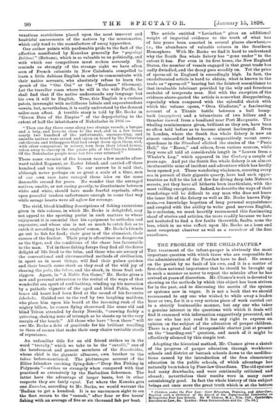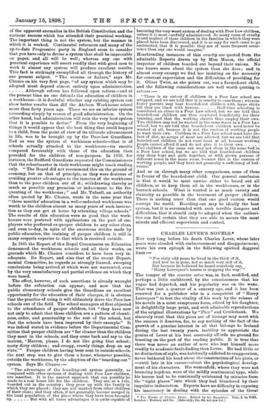THE PROBLEM OF THE CHILD-PAUPER.*
THE treatment of the infant-pauper is obviously the most important question with which those who are responsible for the administration of the Poor-law have to deal. He comes on the parish by no fault of his own, and it is a matter of first-class national importance that he should be brought up in such a manner as never to repeat the mistake after he has arrived at years of discretion. Mr. Chance's work is devoted to showing us the methods by which this object has been striven for in the past, and to discussing the merits of the system or systems now in vogue. It is not a book that we should recommend to any one who wished to while away a leaden hour or two, for it is a very serious piece of work carried out in a strictly businesslike manner, but any one who takes a genuine interest in the questions with which it deals will find it crammed with information suggestively presented, and no one who has not read it has any right to express an opinion on the subject of the education of pauper children. There is a great deal of irresponsible chatter just at present on the "boarding-out" question, and mach of it might be effectively silenced by this simple test.
Adopting the historical method, Mr. Chance gives a sketch of the progress of pauper education through workhouse schools and district or barrack schools down to the modifica- tions caused by the introduction of the free elementary education in the public schools, of which advantage has naturally been taken by Poor-law Guardians. The old systems had many drawbacks, and were continually criticised and abused ; nevertheless their results were in many cases astonishingly good. In fact the whole history of this subject brings out once more the great truth which is at the bottom
• Children under the Poor Law : their Rducatsos., Training. and After-Care. Together with a Criticism of the Report of the Departmental Committee on Metropolitan Poor Law Schools. By W Chance, M.A., Trim. Coll.. Oambridge. Barriater-st-Law, an. London: Swan Sonnenachein and Co. [7a. 6d.3
of the apparent anomalies in the British Constitution and the eminent success which has attended their practical working. The important thing is not the system, but the manner in which it is worked. Continental reformers and many of the up-to-date Progressive party in England seem to consider that you have only to devise a system that shall be impeccable on paper, and all will be well; whereas any one with practical experience will assert readily that with good men to work it almost any system will produce excellent results.
This fact is strikingly exemplified all through the history of our present subject. "The success or failure," says Mr.
Chance on his very first page, "of any system which may be adopted must depend almost entirely upon administration.
Although reform has followed upon reform—and at the present time no one defends the education of children in a workhouse—it is doubtful whether any existing system can show better results than did the Atcham Workhouse school more than forty years ago. There we see an inferior system succeeding simply by reason of good administration. On the other hand, bad administration will ruin the very best system that it is possible to devise." From the very beginning of things it would appear that the best thing that could happen to a child, from the point of view of its ultimate advancement in life, was to be brought up by the Poor-law Guardians.
Bad as was the system of workhouse schools—that is of schools actually attached to the workhouse—its results compared favourably with those of the education then provided for the children of non-paupers. In 1836, for instance, the Bedford Guardians requested the Commissioners that the schoolmaster in their workhouse might teach reading only. "The Board did not recommend this on the ground of economy, but on that of principle, as they were desirous of avoiding greater advantages to the inmates of the workhouse than to the poor children out of it ; withdrawing thereby as much as possible any premium or inducement to the fre- quenting of the workhouse ; " and Mr. Tufnell, an authority often quoted by Mr. Chance, wrote in the same year that "three months' education in a well-conducted workhouse was worth to the children almost as many years of such instruc- tion as they can get at home by attending village schools."
The results of this education were so good that the work- houses were pestered with applications on the part of em- ployers who preferred ex-pauper children to any other class, and even to-day, in spite of the enormous strides made by public education, the training of pauper children is still in many respects superior to that which is received outside.
In 1861 the Report of the Royal Commission on Education denounced the workhouse schools and all their works, on grounds which Mr. Chance considers to have been very in- adequate. Its Report, and also that of the recent Depart- mental Committee, he regards as strongly biassed, sweeping conclusions being arrived at which were not warranted, even by the very unsatisfactory and partial evidence on which they were based.
The effect, however, of such assertions is already wrought before the refutation can appear; and now that the public elementary schools give the Guardians an excellent opportunity for the education of their charges, it is obvious that the practice of using it will ultimately drive the Poor-law schools out of the field. The school managers at first objected to the attendance of pauper children, but "they have now not only to admit that these children are a pattern of cleanli- ness, order, and punctuality to the rest of the school, but that the schools have been improved by their example." It was indeed stated in evidence before the Departmental Com- mittee that pauper children are "far cleaner than the children they meet in the schools, and they come back and say to the matron, Matron, please, I do not like going that school; nasty dirty children; and creepy, crawly things drop on my slate." Pauper children having been sent to outside schools, the next step was to give them a home, whenever possible, outside the workhouse, by the adoption of the" boarding-out" system. Says Mr. Chance :—
" The advantages of the boarding-out system generally, as compared with other systems of dealing with Poor Law children, are manifest. It is the nearest approach that can possibly be made to a real home life for the children. They are, as a rule, boarded out in the country ; they grow up with the family in which they are placed; they are not marked from other children of their class; and they often, if not generally, become merged in the local population of the place where they have been brought
up But with all these advantages it is quite capable of becoming the very worst system of dealing with Poor Law children, unless it is most carefully administered. So many cases of cruelty to and neglect of these children in the families in which they were placed have been discovered, and it is so easy for such cases to go undetected, that it is possible they are of more frequent occur- rence than any one would imagine.'
Heartrending instances of this cruelty are quoted from the
admirable Reports drawn up by Miss Mason, the official inspector of children boarded out beyond their unions. No one knows more about the system than she does ; and in almost every excerpt we find her insisting on the necessity for constant supervision and the difficulties of providing for it. Oliver Twist, as she points out, was a farmed-out child, and the following considerations are well worth quoting in
eXtOYESO
:-
"There is an outcry if children in a Poor Law school are whipped, and we are told that it is cruelty to cane them ; whereas foster parents may beat boarded-out children with large sticks till they are black with bruises Half-time schooling is considered an abuse in a Poor Law school, but we are told that boarded-out children are thus employed beneficially for their training, and that the working classes thus employ their own. Two children may not be washed in the same water in a Poor Law school, but we are told that boarded-out children need never be washed at all, because it is not the custom of working people to wash their own. Children in a Poor Law school must have the best of diet, no scraps of meat are allowed, but we are told that boarded-out children do not want meat at all because working
people cannot afford it and do not give it to their own Two children of the same sex may not sleep in the same bed in a Poor Law school, but we are told that boarded-out children may sleep boys and girls together, or with grown persons of different sexes in the same room, because this is the custom of working people, and they have not generally a sufficiency of bed- rooms.
And so on through many other comparisons, none of them in favour of the boarded-out child. Our general conclusion is that it would be most unwise either to board out all children, or to keep them all in the workhouses, or in the barrack-schools. What is wanted is as much variety and elasticity as possible in the treatment of pauper children. There is nothing truer than that one good custom would corrupt the world. Boarding-out may be ideally the best system, but it is surrounded with such terrible dangers and difficulties, that it should only be adopted when the authori- ties can feel certain that they are able to secure the most minute and efficient supervision and controL



































 Previous page
Previous page